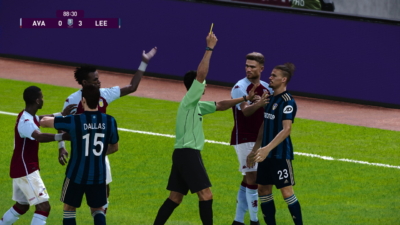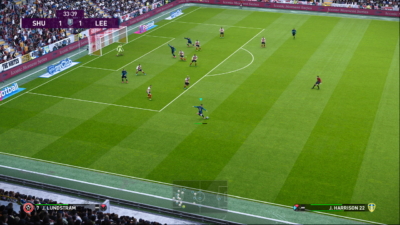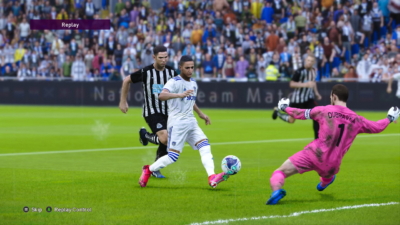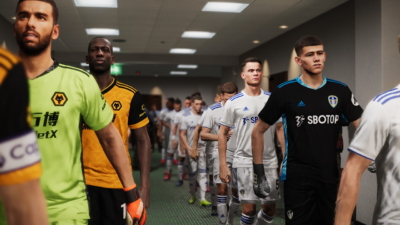I’ve recently had to downgrade my awareness of modern football games from ‘slightly out of touch’ to ‘haven’t really played one properly for 10 years or so’. Since PES 2010, and a brief flirtation with FIFA at around the same time, it’s largely been a case of buying one or other of the two big hitters, playing it on a moderate difficulty setting with little success, and then putting it down. So there’s been a season of FIFA 14 here, and a Euros campaign with PES 2016 there, but nothing close to the Master League madness of 00s PES. (Except when I actually just ended up playing PES 3 again, ostensibly for a feature, and fell – briefly – into that exact same madness for a time).
Unless it comes naturally, making a concerted effort to keep up with modern developments in gaming brings a certain kind of pressure that seemingly runs counter to the goals and objectives of an interest or hobby, but at the same time, drawing a big chalk circle around the period during which you followed gaming most keenly and saying you don’t plan to step outside it still seems a little bit too much like putting your head in the sand. In other words, even though I’ve spent far too much time playing old football games, I don’t want to be the guy who only plays old football games. (Even if I already am him, really.)
And it was the news that PES is no longer PES, is no longer a product that you pay for in the traditional sense, and also the subject of widespread ridicule, that tempted me back this time. If this is going to be the end, let’s have one last dance.
My chosen partner was the delightfully-named eFootball PES 2021 Season Update, the last Konami football game to bear the PES name, and one that is essentially just PES 2020 with some patches and squad updates. It could be the ridiculous title, or a sign of just how out of touch with modern gaming I am, but I spent an embarrassingly long time on the Fanatical sale pages trying to figure out whether the game on offer for a few quid was actually a full game or just a DLC pack, and if it was the former, why were there different ‘club editions’ available, and did that mean you have to buy access to individual teams in football games now. (The answers to such questions are: full game, still not sure, and I don’t think so but that’s possibly the future Konami has in mind).
(Equally, online modes like FIFA’s Ultimate Team and this series’ equivalent, MyClub, are where it’s at now, to the extent that if you’re a 40-year-old Norman No-Mates looking for a bog-standard league season to play in single-player mode, you have to do quite a bit of hunting in the main menu, as if the core idea of someone wanting to take control of his favourite football team against AI opponents for a year is a ludicrous and outdated one.)
All this middle-aged grumbling aside, the good news is that PES 2021 (I’m not calling it eFootball, sorry) does feel like a modern version of the old Pro Evo games. While similar claims had been applied by others to a number of new PES titles in the 2010s, my own experiences meant that I came to take them with a pinch of salt. Throughout my own dabblings with such titles, they just felt fundamentally different to what had come before, and the feeling persisted that instead of trying to recapture old glories, the whole thing had been ripped apart and rebuilt in the name of trying to do something new, different and better. Which, I figured, was fair enough: the PES I remembered belonged in the past. Football games had moved on, but I hadn’t, and that’s why I couldn’t get on with them anymore.

I tell you what, they should just make football a non-contact sport, THESE DAYS. Mate, you can’t do anything, THESE DAYS, can you?
It was the sluggishness that always most alienated me; a feeling that I was back playing [the notoriously unresponsive] FIFA 97, which I assumed would have been noted in reviews if it were universally applicable. Seeing as it wasn’t, I put it down to me being slow, rather than the game.
PES 2021, however, genuinely feels like the old PES games again, in a good way. Players react quickly to your direction, without it being an arcade-y free-for-all runaround. You still have to be careful with the sprint button and focus on keeping the ball, but for once these old lessons served me well rather than making me feel like I needed to do something more complicated to fully understand and enjoy the game.
With Leeds in a 3-6-1 formation, I found myself playing some lovely stuff, sticking to my ancient tactics of passing the ball around, looking for players making attacking runs, and trying to thread it through to them. Dribbling also seems a bit more fathomable, with the slow dribble feature, mapped to the left stick, allowing for some gentle manipulation and trickery without having to commit special moves to memory, Street Fighter 2 style.
My impression of modern football is that players have to be more technically proficient and adaptable these days, rather than sticking to defined roles, and that seems to be reflected here. Individual personalities, however, still came through, from the hard but unglamorous work of Klich and Phillips in midfield, to the wing play of the unpredictable but brilliant Raphinha and the more solidly consistent Harrison, and the lumbering presence of Rodrigo, seemingly too laboured in possession to be suited to a role just behind the striker, but proving surprisingly effective in creating and scoring (if not quite recapturing the dribbling wizardry of 00s PES great Pablo Aimar).
At higher difficulty levels, the old PES games seemed to be better at getting the opposition to shut you out than subjecting you to a good thrashing, and multiple 0-0 draws were second only to their close relation, the 1-0 sucker punch defeat following domination of the game, in terms of causing frustration. (I was never good enough at the 2010s efforts to establish any kind of pattern, with the general stodginess of my own play the main obstacle to success).
Here, though, despite only playing on a moderately hard setting (a source of shame and regret despite having absolutely no hesitation in choosing the middle difficulty for literally any other game) the opposition proved rather clinical, as evidenced by a 4-0 stuffing by Chelsea in my opening match. And I was on track to win the league until an unexpected 3-2 home defeat to Wolves courtesy of a hat trick by Raul Jimenez in my final game.
It’s been the most fun I’ve had with a footy game for a long time. I can see myself playing another season and trying to win the league, and maybe even cranking up the difficulty like in the good old days, at which point some further shortcomings and bugbears may well reveal themselves. For the moment though, the only problems are typical Pro Evo ones, such as the licensing (in the HD era plain kits and daft oversized club badges are a little harder to dismiss with a squint and a shrug, but these days the third-party efforts of brainy Internet people are more easily downloaded and integrated) and the commentary, which is as bad as always, with Peter Drury’s habit of shouting a player’s name to accompany a climactic shot on goal that never actually materialised, when the play has long since moved on, a particularly old-fashioned kind of glitch. But, and this is going to make me sound like a total nostalgia bore, part of the appeal of Pro Evo was always the slightly otherworldly feeling of it all, as if you were in a parallel universe, rather than in a hyper-accurate representation of the modern world of football.
(And speaking of which, I don’t know if the commentary on FIFA is that much better, as my one-time PES rival PG mentioned to me that he had to turn all of the sound off in order to be able to enjoy a recent instalment of EA’s footy franchise).
Perhaps I’m easily pleased, but on this evidence it’s hard to see how PES can have gone so far backwards in its most recent incarnation. The action seems to have moved to a new game engine, which possibly accounts for the much-publicised glitching, while I guess the changes to the name and pricing model have probably eroded some historical goodwill towards the series. It’s a shame, particularly as this instalment seems to have been close to recapturing the old PES magic.






 Posts
Posts